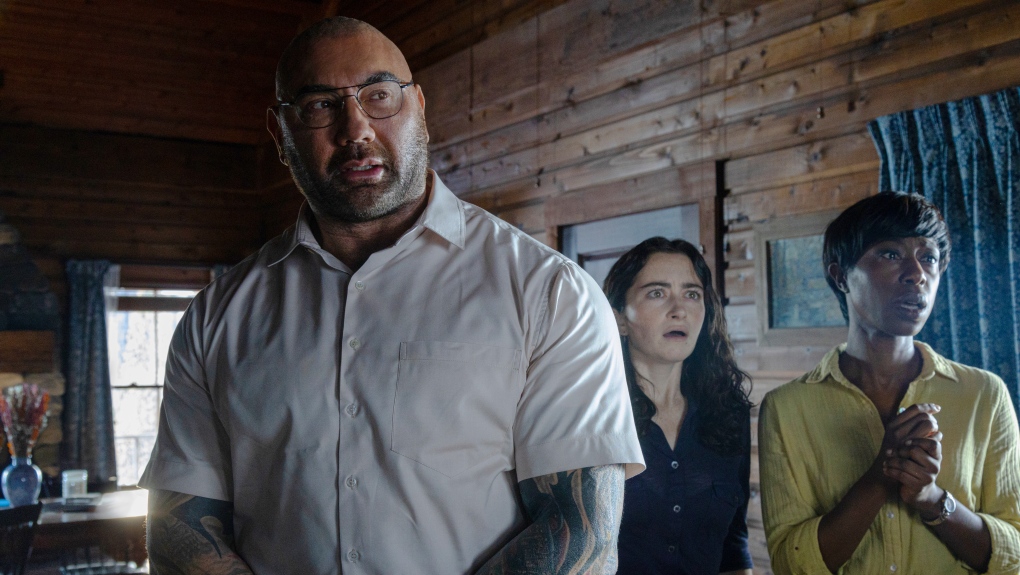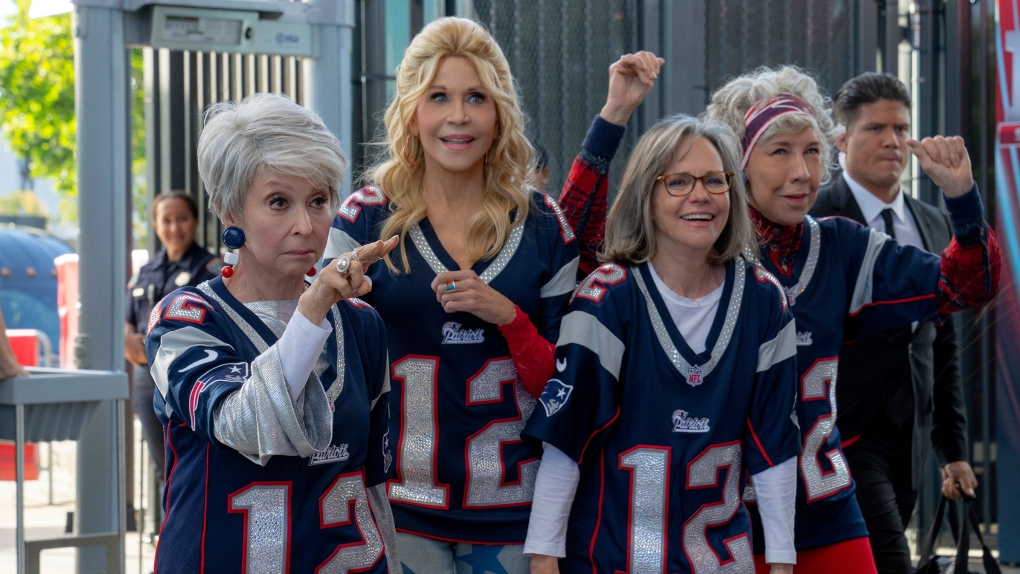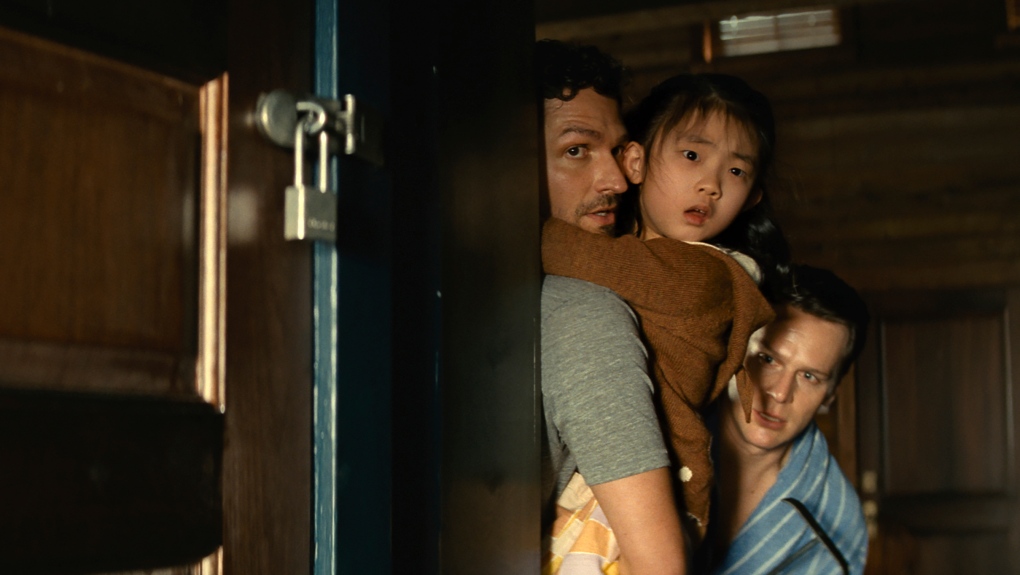
Indian envoy warns of 'big red line,' days after charges laid in Nijjar case
India's envoy to Canada insists relations between the two countries are positive overall, despite what he describes as 'a lot of noise.'
 This image released by Universal Pictures shows Dave Bautista, from left, Abby Quinn, and Nikki Amuka-Bird in a scene from "Knock at the Cabin." (Universal Pictures via AP)
This image released by Universal Pictures shows Dave Bautista, from left, Abby Quinn, and Nikki Amuka-Bird in a scene from "Knock at the Cabin." (Universal Pictures via AP)
“Knock at the Cabin,” the new wannabe nail-biter from director M. Night Shyamalan now playing in theatres, forces its characters into a decision that makes the famous Sophie’s choice seem easy by comparison. A combo of the cabin-in-the-woods genre and a home invasion movie, it demands to know, “Would you sacrifice a loved one to save humanity?”
Based on Paul G. Tremblay's 2018 award-winning novel “The Cabin at the End of the World,” the set-up is simple. A young family, Eric (Jonathan Groff), Andrew (Ben Aldridge) and their seven-year-old daughter Wen (Kristen Cui), are on getaway in a cabin in the middle of nowhere.
It’s idyllic, relaxing, a much-needed break from the pressures of the outside world until one afternoon as Wen is collecting bugs and is approached by a burly man named Leonard (Dave Bautista).
“Why are you here?” she asks.
“I suppose I’m here to make friends with you,” says Leonard, “and your dads too. But my heart is broken because of what I have to do today.”
Freaked out, Wen runs back to the cabin to tell her dads about the strange man she just met. A second later there is a loud knock at the door.
On the other side of the door are heavily armed invaders, the makeshift Four Horsemen of the Apocalypse, Leonard, hot-headed Redmond (Rupert Grint), a nurse named Sabrina (Nikki Amuka-Bird) and the nurturing Adriane (Abby Quinn).
Leonard explains they are not there to hurt them, “but you have to stay in the cabin with us.”
The quartet say they are tasked with “the most important job in the history of the world,” as they present the family with a decision that will change the future, for them and the rest of humanity.
“Families throughout history have been chosen to make this decision,” says Leonard. “Your family must willingly choose one of the three of you (to die) to prevent the apocalypse.”
As the clock moves closer to permanent midnight, Eric, the logical lawyer and Andrew, his spiritually minded husband, must decide whether this is a game of murder, manipulation or divine prophesy.
“Knock at the Cabin” drills down on some very hot button topics. The option of making a great personal sacrifice for the greater good thematically echoes the issues of societal responsibility that arose during COVID lockdowns, and vaccine and mask mandates. Shyamalan plays up the story’s rationality vs. uncertainty angle, which is perhaps the defining theme of the COVID conspiracy era, and yet the movie has none of the richness these themes would suggest.
It's an intriguing premise, but the tension slacks as repetition sets in. I don’t want to give anything away, but Shyamalan establishes a series of events that repeats, sapping the suspense with each cycle.
The talky script hammers home the belief system that brought Leonard and his disciples to the cabin to the point of exhaustion. There are so many avenues for this material to explore, and yet Shyamalan sticks to the narrow lane established in the first ten or fifteen minutes. He plays up the obvious aspects of the story (NO SPOILERS HERE) while working his way toward the play-it-safe ending.
“Knock at the Cabin” mostly wastes an interesting cast and good performances on an underwhelming, hollow story that doesn’t dive deep enough into the collective sense of unease that fuels Leonard and Company’s apocalyptic visions and zealotry. It’s single note story without the emotional basis to become a symphony.
 This image released by Paramount shows Rita Moreno, from left, Jane Fonda, Sally Field and Lily Tomlin in a scene from "80 For Brady." (Scott Garfield/Paramount Pictures via AP)
This image released by Paramount shows Rita Moreno, from left, Jane Fonda, Sally Field and Lily Tomlin in a scene from "80 For Brady." (Scott Garfield/Paramount Pictures via AP)
I guess it is fitting that a team of movie MVPs would band together to tell a story about the greatest football quarterback of all time. It’s just too bad the movie, “80 for Brady,” now playing on theatres, is a bit of a fumble.
Based on a true story, the movie is first and foremost, the tale of the deep bond between football fans, octogenarians Lou (Lily Tomlin), Trish (Jane Fonda), Maura (Rita Moreno), and septuagenarian Betty (Sally Field). The lifelong friends discover football, or more specifically, one footballer, in 2001 when Lou’s television remote broke, leaving the channel stuck on a New England Patriots game.
When the quartet laid eyes on quarterback Tom Brady, they were smitten. “What a beautiful man,” says Trish. “So hydrated,” adds Maura.
Sixteen years later, as the Patriots prepare to take on the Atlanta Falcons at Super Bowl LI, the four fans plan their ultimate get-a-way after winning two pairs of Super Bowl tickets from a local sports call-in show.
“We’re going to the Super Bowl to enjoy men the way the ancient Romans did,” says Lou. “Sweaty and on top of one another in tight pants.”
When it looks like the Patriots are down for the count, Lou, Trish, Maura and Betty, in their bedazzled Brady jerseys, spring into action, providing some much-needed moral support.
“80 for Brady” is a mawkish movie, a firehose spray of sentimentality and easy platitudes. it’s a testament to the collective buddy charisma of the leads that it works as well as it does. The characters may be clichés come to life but without the cast, much of the film’s humour would be as deflated as the footballs used at the 2014 AFC title game against the Indianapolis Colts. Tomlin, Fonda), Moreno and Field’s combined 250 years of on-screen experience breathe life into several showcase scenes.
Moreno earns a laugh or two playing hardball with a scalper and a hot wing eating contest gives Field a chance to heat things up amid the movie’s well-intentioned but overbearingly cheerful bromides.
“80 for Brady” aims to lift up the audience, to inspire, but only in the most superficial ways. There is more edge on any single episode of “Golden Girls” than in the entire running time of this ode to friendship and football.
 This image released by Lionsgate shows, from left, Wunmi Mosaku, Anna Kendrick, and Kaniehtiio Horn in a scene from "Alice, Darling." (Emma Close-Brooks/Lionsgate via AP)
This image released by Lionsgate shows, from left, Wunmi Mosaku, Anna Kendrick, and Kaniehtiio Horn in a scene from "Alice, Darling." (Emma Close-Brooks/Lionsgate via AP)
“Alice, Darling,” a new psychological drama starring Anna Kendrick, now on VOD and in select theatres, is a portrait of a woman who rediscovers both her essence and courage in the aftermath of an emotionally abusive relationship.
Kendrick is Alice, a young woman under the control of her emotionally manipulative artist boyfriend Simon (Charlie Carrick). In the film’s opening scene, she is out for dinner with best pals Sophia (Wunmi Mosaku) and Tess (Kaniehtiio Horn), but is anxious, agitated, repeatedly checking her phone and bristling when her friends joke about the waiter having a thing for her.
When the three plan a remote weekend get-a-way to celebrate Tess’s birthday, Alice lies to Simon and spends the whole time on tenterhooks.
“You can’t tell your life partner that you’re going on a trip with our best friends?” asks Tess. “I can’t think of a bigger red flag than that.”
“I don’t know how any of this is any of your business,” replies Alice.
Tensions between the friends bubble over during the time away until Alice comes clean about the nature of her relationship with Simon.
“You never know what is going to make him angry,” she says. “I spend all this time trying to be good. Trying to be better. I’m never good enough.”
Just as it seems the clouds have lifted and smiles appear on their faces for the first time in days, Simon, who has been unable to reach Alice, shows up at their cabin. “You look different,” he says. “She looks like herself,” say her friends.
In a brisk ninety-minute running time, “Alice, Darling” conveys the warning signs of Simon’s gaslighting, and the effect it has on Alice. Simon’s brand of abuse is insidious. “He doesn’t hurt me or anything,” she says. But he does get into her head, using his narcissism like a shroud to cloak her own feelings and desires. Simon’s actual role in the film, in terms of screen time, is fairly brief, but his presence is felt throughout.
Carrick personifies the kind of malevolent, arrogant jerk who demands to know, “Why would you hurt me like this?” at the slightest of provocation, but it is Kendrick’s work that gives the movie its power. In a performance that mixes the introspective with the physical, she portrays Alice’s turmoil. From pulling her own hair out, to her hollow-eyed stare, Kendrick is an authentic and believable victim of Simon’s brainwashing.
Director Mary Nighy (daughter of recent Best Actor nominee Bill) relies on Kendrick to carry “Alice, Darling’s” weight. The film wraps things up a bit too tidily at the end, but the power of Alice’s story remains undiminished.

India's envoy to Canada insists relations between the two countries are positive overall, despite what he describes as 'a lot of noise.'
With Donald Trump sitting just feet away, Stormy Daniels testified Tuesday at the former president's hush money trial about a sexual encounter the porn actor says they had in 2006 that resulted in her being paid to keep silent during the presidential race 10 years later.
The U.S. paused a shipment of bombs to Israel last week over concerns that Israel was approaching a decision on launching a full-scale assault on the southern Gaza city of Rafah against the wishes of the U.S.
Footage from dozens of security cameras in the area of Drake’s Bridle Path mansion could be the key to identifying the suspect responsible for shooting and seriously injuring a security guard outside the rapper’s sprawling home early Tuesday morning, a former Toronto homicide detective says.
A chicken farmer near Mattawa made an 'eggstraordinary' find Friday morning when she discovered one of her hens laid an egg close to three times the size of an average large chicken egg.
Susan Buckner, best known for playing peppy Rydell High School cheerleader Patty Simcox in the 1978 classic movie musical 'Grease,' has died. She was 72.
Accused killer Jeremy Skibicki could have a challenging time convincing a judge that he is not criminally responsible for the deaths of four Indigenous women, a legal analyst says.
A Calgary bylaw requiring businesses to charge a minimum bag fee and only provide single-use items when requested has officially been tossed.
Two Nova Scotia men are dead after a boat they were travelling in sank in the Annapolis River in Granville Centre, N.S., on Monday.

An Ontario man says he paid more than $7,700 for a luxury villa he found on a popular travel website -- but the listing was fake.
Whether passionate about Poirot or hungry for Holmes, Winnipeg mystery obsessives have had a local haunt for over 30 years in which to search out their latest page-turners.
Eighty-two-year-old Susan Neufeldt and 90-year-old Ulrich Richter are no spring chickens, but their love blossomed over the weekend with their wedding at Pine View Manor just outside of Rosthern.
Alberta Ballet's double-bill production of 'Der Wolf' and 'The Rite of Spring' marks not only its final show of the season, but the last production for twin sisters Alexandra and Jennifer Gibson.
A mother goose and her goslings caused a bit of a traffic jam on a busy stretch of the Trans-Canada Highway near Vancouver Saturday.
A British Columbia mayor has been censured by city council – stripping him of his travel and lobbying budgets and removing him from city committees – for allegedly distributing a book that questions the history of Indigenous residential schools in Canada.
Three men in Quebec from the same family have fathered more than 600 children.
A group of SaskPower workers recently received special recognition at the legislature – for their efforts in repairing one of Saskatchewan's largest power plants after it was knocked offline for months following a serious flood last summer.
A police officer on Montreal's South Shore anonymously donated a kidney that wound up drastically changing the life of a schoolteacher living on dialysis.
 This image released by Universal Pictures shows Ben Aldridge, from left, Kristen Cui, and Jonathan Groff in a scene from "Knock at the Cabin." (Universal Pictures via AP)
This image released by Universal Pictures shows Ben Aldridge, from left, Kristen Cui, and Jonathan Groff in a scene from "Knock at the Cabin." (Universal Pictures via AP)